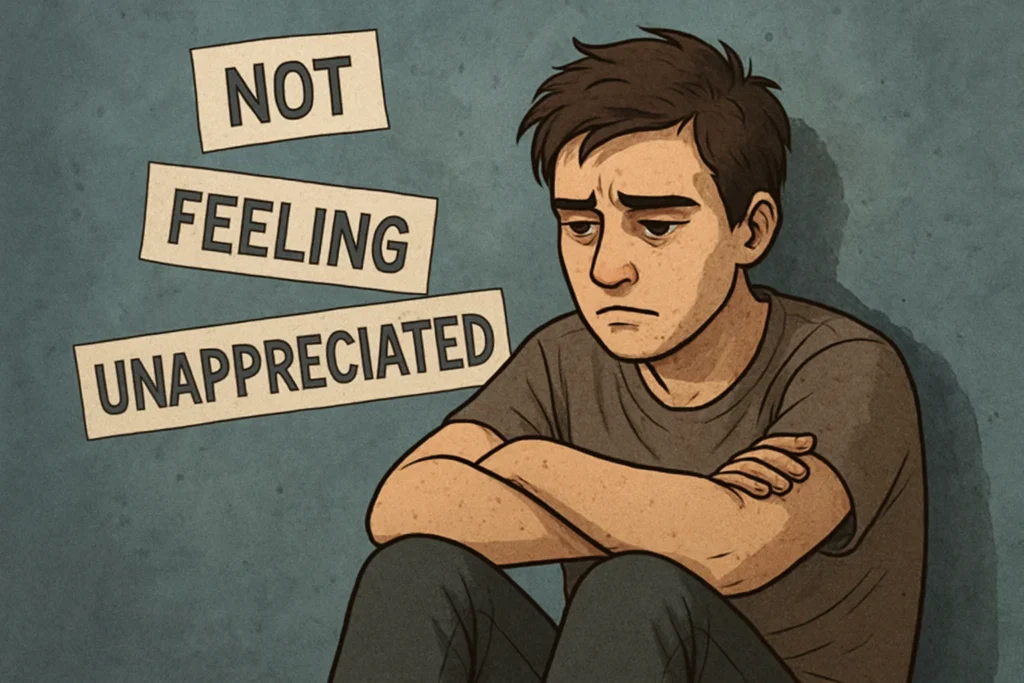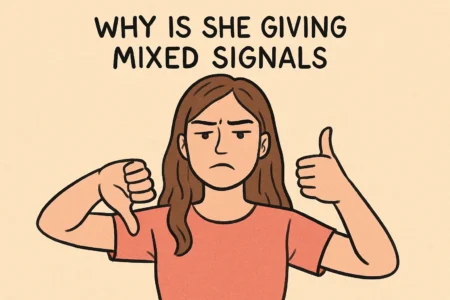It’s not a lightning strike. It’s a slow burn. A dull, quiet ache that settles in your gut and doesn’t leave. You fix the leaky faucet. You stay late to crush a deadline. You listen patiently while your partner unloads about their day. You mow the lawn, every single Saturday. You do the things a man is supposed to do. But the space where a simple “thank you” should be is just… empty. Silence. And that silence gets heavier by the day. You start to wonder if anyone even sees you. You feel invisible. Taken for granted. So, what if I feel unappreciated?
It’s a dangerous question that can echo in a man’s quietest moments, making him doubt his own worth, his effort, his place in his own life. This isn’t about needing a gold star. It’s about a fundamental human need to be seen and respected.
This guide is for you. It’s a no-BS roadmap to navigating that hollow feeling, understanding where it comes from, and building a foundation of self-respect so strong that the approval of others is a welcome bonus, not the air you need to breathe.
More in Relationship Health Category
How To Set Boundaries With Her
Red Flags Men Should Not Ignore
Key Takeaways
- Feeling unappreciated is a human thing, not a weakness. The first step is just admitting that it sucks.
- Your worth isn’t up for a vote. Getting respect from others starts with respecting yourself, period.
- Expecting people to read your mind is a losing game. Clear, honest communication is your only real tool.
- Boundaries aren’t selfish. They’re a form of self-defense that teaches people how you expect to be treated.
- You are the one in the driver’s seat. You control your actions and reactions, and that’s how you shape the way the world sees you.
Why Does Feeling Unappreciated Hit Men So Hard?
It’s a feeling that just gnaws at you, right? More than a passing mood. For a lot of men, feeling unappreciated cuts deep, hitting a raw nerve connected to identity, purpose, and pressure. It feels personal because it is. It can feel like a direct shot at your competence, stirring up a nasty cocktail of frustration, anger, and resentment. To really get it, you have to look under the hood and figure out what’s actually going on.
Is It Just My Ego, or Something Deeper?
For generations, men have been handed a clear, unspoken job description: be the provider, the protector, the rock. The guy who just handles it. You’re supposed to carry the weight without showing the strain and find your value in what you do. It doesn’t matter if you’re a CEO or a stay-at-home dad; that programming is buried deep. So when your contributions—the long hours, the silent sacrifices, the constant grind—go completely unnoticed, it feels like more than a simple oversight. It can feel like a personal failure.
I saw this with my own father. He was a man who seemed to be carved from stone, a tireless provider who never once complained about his brutal job. His love language was action—a freshly painted room, a repaired bike, a paid bill. But we rarely said thank you.
We just… expected it. I can still see him coming home, smeared with grease and exhaustion, the light in his eyes a little dimmer each year. It took a health scare late in his life to make him finally start asking for a little acknowledgment. The difference was night and day. A simple, “Dad, thanks for everything you do,” seemed to lift a burden he’d been carrying for forty years. It wasn’t his ego that needed stroking; it was his spirit.
Could It Be a Mismatch in How We Show and See Appreciation?
Ever buy someone a gift you were sure they’d love, only to get a polite, flat “Oh, thanks”? The same thing happens with appreciation. We all have different “languages” for showing it and feeling it. You might express your commitment through “acts of service”—keeping the cars running, handling home repairs, making sure the finances are solid. To you, these actions are loud and clear proof of your love and dedication.
But what if your partner’s primary language is “words of affirmation”? For them, hearing “I really appreciate you” carries more weight than the act itself. Or maybe they crave “quality time,” so the long hours you work—which you see as an act of providing—feel to them like a rejection. Nobody’s wrong here. It’s a communication breakdown. You’re speaking Spanish, and they’re listening for French. The result? You both end up feeling unheard and completely unappreciated, stuck in a maddening cycle of resentment.
What If I’m The One Who’s Setting Myself Up for This Feeling?
This is a tough one to face, but let’s be honest: sometimes, we’re our own worst enemy. Sometimes, the pattern of being overlooked starts with us. This isn’t about blaming yourself. It’s about taking back your power. Realizing how your own habits might be feeding the problem is the first real step toward fixing it for good. It means taking a hard look in the mirror and asking if you’ve been teaching people that it’s okay to take you for granted.
Am I Secretly Hoping People Can Read My Mind?
The “strong, silent type” is a trap. You handle your business, you don’t complain, and you sure as hell don’t ask for a pat on the back. Here’s the problem with that: it works on the assumption that your efforts are so blindingly obvious that they speak for themselves. You assume your wife sees the overtime you’re putting in. You assume your boss gets how much work that project took. You assume your kids understand the sacrifices.
Newsflash: they don’t. People are drowning in their own lives, fighting their own battles. They aren’t malicious; they’re just busy. They can’t see the mental gymnastics you perform daily to keep everything from falling apart. They don’t feel the stress you carry home from a tense meeting. When you stay silent, you’re gambling with your own worth. Expecting them to connect the dots and give you what you need without ever saying a word is a surefire way to end up bitter and resentful. Unspoken expectations are just premeditated resentments.
Do I Say “Yes” When I Really Mean “No”?
Are you the guy? The one everyone calls because they know you’ll drop everything and come running? Being reliable is a great quality, but there’s a razor-thin line between being helpful and being a doormat. Constantly saying “yes” to every single request sends a clear message: my time and energy have no value.
When you consistently put everyone else’s needs ahead of your own, you devalue yourself. You teach people that you’re the guy who can always handle more, the one who never needs a break. Soon enough, they stop asking for your help and start expecting it. Your sacrifice becomes the new normal, not something worthy of thanks. Every time you say “yes” when you’re screaming “no” on the inside, you’re not just adding to your workload; you’re chipping away at your self-respect. That road doesn’t lead to appreciation. It leads straight to burnout and the soul-crushing feeling of being used.
So, How Do I Actually Start Getting the Respect I Deserve?
Okay, enough diagnosing the problem. Let’s talk solutions. Moving from feeling unappreciated to feeling respected isn’t going to happen by itself. It demands that you actively change how you think and what you do. This isn’t about being a jerk or demanding applause. It’s about building a solid core of self-worth and then learning how to communicate that value to everyone else. This is where the real work starts.
Where Does Building Self-Respect Even Begin?
It starts inside. Period. You can’t get genuine respect from others if you don’t respect yourself first. What other people think of you will change with the weather. Self-respect is the bedrock. It’s the ground you stand on when everything else is shaking. When you respect yourself, you project a quiet confidence that people can’t help but notice.
Start by being your own champion. Give yourself credit for your hard work. We have a bad habit of brushing off our own wins with, “I was just doing my job.” Stop it. Take a damn minute to recognize the skill and effort you put in. A simple way to start is with a private “win journal.” At the end of the day, write down one thing you did well.
It might feel cheesy at first, but it rewires your brain to see your own value. And invest in yourself. Make time for that hobby, sign up for that class, hit the gym. When you pour time and energy into your own growth, you send a clear message to the world, and more importantly, to yourself: I am worth it.
How Can I Communicate My Needs Without Sounding Needy or Aggressive?
Communication is everything. It’s the bridge from feeling invisible to feeling understood. But for a lot of guys, talking about emotional needs feels like a trap. You don’t want to sound weak, but you don’t want to come off like an angry jerk, either. The secret is to shift your language from accusation to explanation by using “I” statements.
I learned this the hard way. I used to start sentences with “You never…” or “You always…,” which is like throwing a grenade into a conversation. It was a male friend who finally set me straight. He explained that starting with “I feel…” isn’t weak—it’s taking ownership of your own damn feelings. It’s a total game-changer.
Instead of, “You never thank me for taking out the trash,” try this: “When I handle chores like the trash and it goes unnoticed, I feel unappreciated.” The first is an attack. The second is just you stating your reality. It invites your partner to see your side, not to fight back. Here’s the formula:
- Start with your feeling: “I feel…” (frustrated, overlooked, taken for granted).
- Describe the specific behavior: “…when…” (I work late to provide for us, I spend my weekend fixing things around the house).
- Explain the impact: “…because…” (it makes me feel like my efforts don’t matter).
- State your need: “I would really appreciate…” (if you would acknowledge it sometimes).
This isn’t begging. It’s calmly and clearly telling someone what’s going on in your head and giving them a chance to meet you halfway.
What Are the Practical Steps for Setting and Enforcing Boundaries?
Boundaries are the invisible fences we draw around ourselves. They tell people what’s okay and what’s not okay. They protect our time, our energy, and our sanity. Without them, we’re wide open to being overworked, over-committed, and completely unappreciated. Setting them feels weird at first, especially if you’re the “yes” guy. But they are absolutely critical for any healthy relationship, at home or at work.
Isn’t Setting Boundaries Just Selfish?
That’s the biggest myth out there. We’re conditioned to think that being a good guy means being endlessly available. The truth is, a lack of boundaries just creates resentment, and resentment poisons everything. A person without boundaries isn’t a good person; they’re a doormat.
Think of it like a fence around your yard. The fence isn’t there because you hate your neighbors. It’s there to clearly mark what’s yours and what’s theirs. It creates a space for healthy, respectful interactions at the gate. Personal boundaries do the same thing. They don’t shut people out. They create the structure required for real respect. They are a powerful act of self-respect that says, “My well-being matters.”
What Does a Healthy Boundary Actually Look Like in Real Life?
Boundaries aren’t some fuzzy, abstract idea. They are clear, simple, practical choices you make every day. The trick is to be firm without being a jerk. You don’t need a five-page explanation or a heartfelt apology for protecting yourself.
Here’s what they look like in the wild:
- At Work: It’s Friday at 4:30 PM, and your boss drops a new “urgent” project on your desk. Instead of sighing and canceling your weekend plans, you say: “I want to give this the focus it deserves. I’m wrapped for the day, but I’ll make it the first thing I tackle Monday morning.”
- With Your Partner: You walk in the door after a brutal day, and you’re immediately hit with a barrage of complaints. You say: “I absolutely want to hear about this. Just give me 20 minutes to change and clear my head, and then you’ll have my full attention.”
- With Friends: A buddy asks for help moving on your one free Saturday of the month. Instead of giving up your whole day, you say: “Happy to help, man. I can give you a solid three hours from 9 AM to noon.”
What If People React Badly When I Set a Boundary?
They might. Be ready for it. When you suddenly start drawing lines with people who are used to you being a wide-open field, you’re going to get some pushback. They might get angry, play the victim, or try to guilt-trip you. They might call you selfish or say you’re “not a team player.”
Let them. Their reaction is their problem, not yours. In fact, a huge, negative reaction is usually a giant flashing sign that the boundary was long overdue. The people who were benefiting from you having no boundaries will, of course, protest when you build a fence. As experts on assertive communication from MIT advise, your only job is to state your position clearly and calmly. Don’t get dragged into a debate. Just hold your ground. It will be uncomfortable at first. But every time you do it, you strengthen your self-respect and teach people how to treat you. The ones who matter will adjust. The ones who don’t? Well, now you know.
How Do I Rebuild My Confidence When I Feel Worn Down?
Being consistently overlooked isn’t just annoying; it’s corrosive. It slowly grinds down your self-esteem until you feel cynical, insecure, and just plain tired. When you’re in that hole, finding the energy to stand up for yourself feels impossible. That’s why rebuilding your confidence isn’t optional—it’s the whole damn point. It’s about remembering who you are, independent of anyone else’s approval.
Can I Really “Fake It ‘Til I Make It”?
Forget “fake it ’til you make it.” Think “act as if.” This isn’t about being a phony. It’s about consciously choosing the posture and attitude of the respected, confident man you know you are. Your body language screams volumes before you ever say a word. When you feel beaten down, you slump. You avoid eye contact. You mumble. You project weakness, and people, unfortunately, respond to that.
Start with small, physical adjustments. Stand tall. Pull your shoulders back. Walk into a room like you belong there. When you talk to people, look them in the eye. Speak a little more slowly and deliberately. Cut out the “ums” and “uhs.” These aren’t parlor tricks. They are powerful signals to your own brain and to everyone else. You aren’t pretending. You are stepping into the most capable version of yourself. You are choosing to project strength, and in doing so, you start to feel it.
Who Should I Be Surrounding Myself With?
You’ve heard it a million times: “You are the average of the five people you spend the most time with.” It’s a cliché for a reason. Your inner circle is either a charging station or a drain. If you’re surrounded by takers, critics, or people who only see you as useful, your self-worth will be under constant assault.
I watched this happen to my own brother. For years, his “friends” communicated almost exclusively through sarcastic put-downs. They minimized his successes and took full advantage of his good nature. He was their punching bag. He thought that’s just how guys were. Then he started volunteering for a crew that built houses.
Suddenly, he was around people who admired his skills, respected his hard work, and actually listened to his ideas. The difference was night and day. Seeing himself reflected in their eyes changed everything. He slowly cut the cord with his toxic friends, and his confidence exploded. Take a hard look at your crew. Are they building you up or tearing you down? Find the people who challenge you, support you, and respect you for who you are—not just for what you can do for them.
Your Value Is Not Up for Debate
The road from feeling invisible to feeling respected isn’t about becoming someone else. It’s about finally valuing yourself enough to show others how it’s done. It means trading bitter silence for clear communication and swapping the need to please for the courage to set boundaries. That nagging feeling of being unappreciated isn’t a weakness; it’s a wake-up call. It’s a signal that you need to start paying attention to your own needs.
You can’t make someone say “thank you.” You can’t force another person to see your worth. But you are in 100% control of your own actions. You can respect yourself. You can speak your truth. You can decide what you will and will not tolerate. That is your power. Start using it. Today. Give yourself credit for one small win. Say “no” to one thing you just don’t have the energy for. Have one honest conversation. Every small step is a brick in the foundation of a life where your value isn’t just something others might see, but a fact that you know in your bones.
FAQ – What If I Feel Unappreciated
Why does feeling unappreciated affect men so deeply?
Feeling unappreciated hits men hard because it often challenges their sense of identity, purpose, and pressure to fulfill societal roles like provider and protector, which are deeply ingrained in their programming and self-worth.
How can I start building self-respect to feel less unappreciated?
Building self-respect begins with self-recognition and positive reinforcement; acknowledge Your efforts, take pride in your achievements, and invest in personal growth through hobbies or activities that reinforce your worth.
What is an effective way to communicate my needs clearly without seeming needy?
Use ‘I’ statements to express your feelings and needs calmly, such as saying, ‘I feel unappreciated when my efforts go unnoticed,’ which invites understanding without sounding accusatory.
How do I set boundaries without feeling guilty or causing conflict?
Boundaries are essential for healthy relationships; set them clearly and calmly by explaining what you need and why it’s important, knowing that initial resistance is normal and that your well-being is worth it.
What steps can I take if I feel worn down and my confidence is low?
Rebuilding confidence involves acting as if you are confident through body language, celebrating small wins, surrounding yourself with supportive people, and recognizing your own value independent of external validation.





